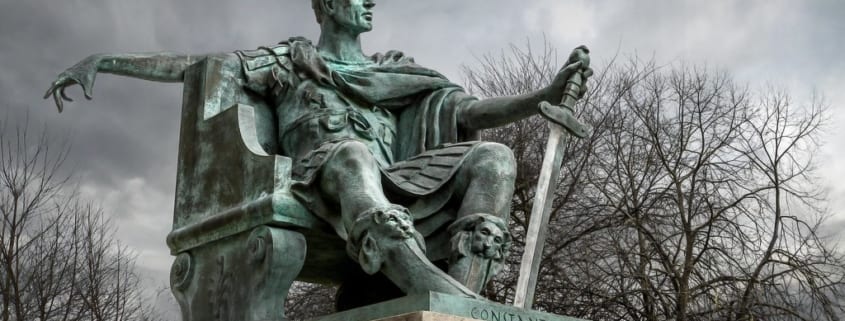Was He Really A Christian: Emperor Constantine
Was He Really A Christian?
for whoever is not against us is for us.
Mark [9:39]-40
Flavius Valerius Constantinus was born in Serbia in 280AD. While not a native Roman, he would rise to become the Roman Emperor in 324AD. Later in life, he shortened his name to Constantine. His rise to becoming the Roman Emperor changed the course of Christianity. Christianity would move from being a persecuted underground religion to becoming the state religion of the Roman Empire.
Constantine’s father had been the Western Roman Emperor, during the period when the Roman Empire actually had three co-rulers. Because of his birthright, Constantine rose quickly up the military ranks, but in his own right, he was a great general and administrator.
Too late
Constantine was skillful in politics and convinced a superior over wine to let him be assigned to his father, which would help his career. To ensure the decision would not be overturned the next morning. Constantine rode multiple horses through the night to give the news to his father. At each outpost he would leave his horse and mount up on another. By the time he got to his father, it was too late for the decision to be reversed.
Constantine worked under his father in Great Britain and was key in a number of the battles. As his father was dying he was appointed to take over his father’s position. But his status was always in question. Like many of the rulers of Rome, having a strong army was the key to gaining and keeping power. Over the next few years, Constantine fought a number of battles to keep his position.
The Emperor
One battle, in particular, was critical for Constantine and Christianity. During this period of civil war, his main competitor Maxentius, was threatening Constantine and would engage in battle with him at the Milvian Bridge on the Tiber river. The winner would be the emperor of the western Roman empire.
Prior to the battle, Constantine had a vision that prompted him to have the letters CH put on his soldier’s shield. CH being short for Christos or Christ in English. Even though Constantine was outnumbered two to one. He won the battle.
While previously a worshiper of the Roman Sun god, he became a quasi-Christian. Not fully in, but curious about Christianity.
The following year in 313AD he issued the Edict of Milan, which legalized the Christian religion. Essentially, ending all persecution and allowing Christianity to move more freely in the western Roman Empire.
The Nicene Creed
During the next few years, he consolidated his power and became the sole Roman Emperor. At the same time he moved closer to becoming a Christian. One thing he noticed was the amount of discord with the theology of Christianity. Particularly with the divinity of Jesus. Knowing this could create discord and upset harmony in the Roman Empire, in 325AD he called for a meeting of the bishops in Nicea. Out of this meeting, Jesus’s divinity was affirmed, and the Nicene Creed was developed.
Constantine still didn’t give up his worship of the sun and in a way merged in his mind Christianity with his sun God worship. For instance, He made the first day of week into a day to worship the sun, a day of rest. To which he made Christian’s move the Sabbath to “Sunday.”
Not only that, he is responsible for making Christmas the 25th of December. In those times the Winter Solstice was thought to be on December the 25th. To honor the birth of the new sun, he made it a feast day. Merging the birth of Christ with the birth of a new sun.
He also was anti-Semitic and thought celebrating Passover was inappropriate for Christians and had Easter replace the Passover. Easter at that time was a feast for springtime fertility.
Once again merging Roman theology with Christian theology.
Constantine held off being baptized until he was near death. Afraid his sins would be taken into account. So even at the end of his life, he bent the rules.
It would easy to say that Constantine wasn’t really a Christian. Perhaps he was just happy that Jesus helped him win an important battle. Maybe that is true. But it is also true that he released Christians from having to worship underground. He supported and created some of the Christian holidays, while in a misguided way. And he did become fully Christian at his death.
It reminds me of the verse that Jesus said to the Apostles, who were complaining about a person who was driving out demons in Jesus’s name but wasn’t one of them. Jesus said; for whoever is not against us is for us.
I think about this verse often.
As humans, we all don’t follow Jesus exactly, and some stray more than others. And Constantine certainly mangled a lot of Christian theology. But in the end, he was for Christianity and not against it. While some scholars will doubt this an accurate portrayal, I prefer to give Constantine the benefit of the doubt, because I succumb to my own weaknesses on how to follow Jesus. As do others. We all have our shortcomings, but it doesn’t mean we aren’t Christians. It means we sometimes let our human impulses get in the way.
I suppose Jesus is right, not all of us follow exactly as we should; it is more important that we try with all our heart and soul to follow Jesus.
Listen to the Full Podcast – Emperor Constantine
Blessings, until next time,
Bruce L. Hartman
Photo by guille pozzi on Unsplash
We love giving credit to budding photographers to help them gain more exposure.



